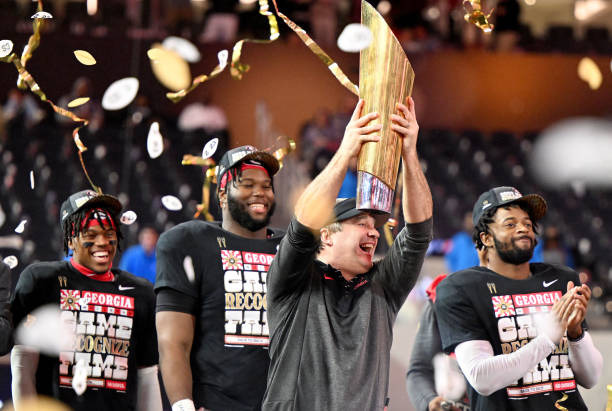Table of Contents
This year’s NCAA College Football Playoff will be slightly different from previous years. The playoffs will expand from four teams to 12 teams in 2024, and the winner will be crowned national champions.
With that in mind, here are the teams with the best college football futures odds for the 2024-25 season at our favorite college football betting sites.
2025 College Football Futures Odds
Here are the CFB National Championship odds heading into Week 14 of the 2024 season. NCAA champion odds may vary by sportsbook and are subject to change.
- Ohio State: +250
- Georgia: +350
- Oregon: +400
- Texas: +450
- Notre Dame: +1500
- Penn State:+1800
- Tennessee: +2200
- Miami (FL): +3000
- SMU: +3500
- Alabama: +4000
- Indiana: +5000
- Clemson: +5000
- Arizona State: +10000
What’s a College Football Futures Bet?
The answer is right there in the name: It’s wagering on specific college football outcomes that won’t be decided until well into the future on the NCAAF schedule. We’re talking well beyond Thanksgiving, and sometimes not until the new year.
CFB futures are good for casual sports bettors who don’t have the time, interest or bankroll to engage in week-to-week wagering.
By placing a bet on things like the National Championship winner or which player will win the Heisman Trophy, you can (theoretically) have bets that last the entire season.
Another advantage of NCAAF futures betting is that bettors can wager a little for the opportunity to win a lot, especially if you use bonus bets from a sportsbook’s welcome offer.
For example, if you think the Baylor Bears are a contender—one that’s capable of winning the National Championship for the first time in school history—you can make a preseason bet at potentially longer odds than once the season gets underway.
Why do sportsbooks offer these kinds of “long” odds? Because predicting season-long winners is very difficult.
When Can You Make a CFB Futures Bet?
Most bettors place college football futures wagers before the start of the regular season, but that’s certainly not required. In fact, most futures markets remain open at betting sites throughout the entire season, with sportsbooks constantly adjusting odds based on player and/or team performances, significant injuries and other developments.
Sportsbooks will also react to public perception. If a sportsbook sees a heavy amount of action on a particular team or player, it will reduce the odds to lower potential payouts and make betting on the team/player less enticing. Conversely, if a sportsbook receives minimal action on a team or player, it will raise the odds in hopes of attracting bets.
Sometimes these odds shifts happen weekly, sometimes daily and sometimes every few hours. The goal when making CFB futures bets is to pounce when the plus-odds are at their peak to maximize value. However, that’s easier said than done.
How Much Do You Have to Wager on College Football Futures?
Like with any sports bet, you can risk as little as $1 on a college football futures wager. Obviously, the more you bet, the more you stand to win (or lose). And the higher the odds, the larger the potential payout.
Hypothetical example: At FanDuel Sportsbook, Ohio State has +300 odds to win the National Championship, while Alabama has +1000 odds.
If you bet $10 on Ohio State, you would earn $30 in profits if they win it all. If you put $10 on Alabama to win, however, you’d earn $100 in profits if they go all the way.
Generally speaking, you don’t want to tie up too much of your betting bankroll in futures since a) they’re risky, and b) they take longer to pay out.
National Championship Futures Explained
Casual bettors often are drawn to National Championship futures so they can bet on their favorite team and make some money if that team caps a charmed season with a title.
Conversely, so-called sharp bettors get involved in championship futures markets for one reason: value. If they think oddsmakers are selling particular teams short, they’ll jump on them.
For much of the 2023-24 season, Georgia was favored to win the National Championship after winning the previous two years. Michigan, who ended up winning, had longer odds, especially early in the season. Bettors who jumped on them early made more money than bettors who waited deep into their undefeated season.
Sportsbooks waste little time releasing odds for the National Championship, with new odds posted the day after the previous one. These odds fluctuate throughout the offseason depending on transfers and coaching changes, then keep shifting throughout the season based on injuries and team performance.
College Football Playoff Futures
Confident that a certain team will make the College Football Playoffs but not sure it will go all the way? Then consider making a CFP wager.
As you’d expect, the teams at the top and bottom of the CFP odds board mirror those at the top and bottom of the National Championship odds list. However, the odds will be different as it’s much easier to reach the CFP (12 teams make it) than be the last team standing.
Conference Winner Futures
It’s also possible to bet on which team will win their conference, i.e. the SEC, ACC, Big 12, Big Ten, etc.
These bets are easier because conferences are smaller and typically only have a few powerhouses, so only a handful of teams in each conference have a realistic chance of winning.
For example, Oklahoma has won a whopping 50 conference championships, followed by Nebraska (46) and Michigan (45) for most all-time.
As a result, some dominant teams may have minus odds.
Team Win Total Futures
Want to get the biggest bang for your CFB betting buck? Consider making some NCAAF season win total wagers. This futures bet is simple and a good alternative to betting on individual games.
Here’s how it works. Prior to the season, sportsbooks project a number of victories for each team, then lets bettors to decide if they want to wager “Over” or “Under” that number.
The best teams—those at the top of the National Championship odds board—have the highest projected win totals, while the presumed worst teams have the lowest.
For example, Notre Dame may have an Over/Under of 9.5 wins, while Oregon’s might be a bit lower at 7.5 wins.
This way, you can bet on a team having a successful regular season before the randomness of the playoffs ensues.
Player Futures
The most popular, and sometimes the only, college football player future offered at sportsbooks is which player will win the Heisman Trophy.
Similar to the National Championship market, this market tends to have plus odds at the start of the season before frontrunners emerge. Odds will change throughout the season depending on how players and their teams perform.
By the end of the year, there’s usually only a handful of realistic candidates — typically the quarterbacks for the best schools in the country, similar to the NFL MVP award.
Photo credit: MediaNews Group via Getty Images.



